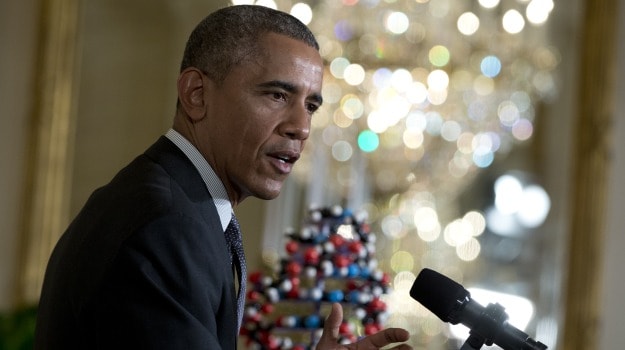President Barack Obama on Friday called on Congress to approve spending in medical research that tailors treatment to an individual's genes, moving away from one-size-fits-all care.
Obama wants $215 million for what he's calling a precision medicine initiative. The ambitious goal: Scientists will assemble databases of about a million volunteers to study their genetics - and other factors such as their environments and the microbes that live in their bodies - to learn how to individualize care.
"That's the promise of precision medicine -- delivering the right treatment at the right time, every time, to the right person," Obama said in announcing the proposal Friday.
The effort is a hot but challenging field in medical research that has already yielded some early results. For example, it's becoming more common for patients with certain cancers to undergo molecular testing in choosing which drug is their best match. People with a rare form of cystic fibrosis now can choose a drug designed specifically to target the genetic defect causing their illness. Some medical centers, such as the Mayo Clinic, have opened "individualized medicine clinics."
But only recently has the cost of genomic sequencing dropped enough, and the computer power of medicine increased, to make it possible for large-scale pursuit of the approach, said Dr. Francis Collins, director of the National Institutes of Health, which will lead the initiative. The hope is to "harness the power of science to find individualized health solutions," Collins said. Obama noted that doctors often try to personalize care, such as matching blood transfusion to blood types.
"What if matching a cancer cure to a genetic code was just as easy, just as standard?" he asked. "What if figuring the right dose of medicines was as a simple as taking a temperature?"
In the short term, precision medicine holds the most promise for cancer because scientists already know a lot about the molecular signatures of different tumors, Collins said. Details of the initiative still are being worked out, but the NIH plans to use some large genomic studies already under way as well as new volunteers, he said.
According to a Xinhua report, the funding that Obama wanted for the initiative would include $130 million for the National Institutes of Health (NIH) to create a voluntary national research group of a million or more volunteers. This project will "leverage existing research and clinical networks and build on innovative research models", the White House said. The NIH's National Cancer Institute would receive $70 million to scale up efforts to identify genomic drivers in cancer and apply that knowledge in the development of more effective approaches to cancer treatment. A total of $10 million would go to the Food and Drug Administration (FDA) to develop new approaches for evaluating next-generation genetic tests. Another $5 million would go to the Office of the National Coordinator for Health Information Technology to support the development of standards that address privacy and enable secure exchange of data across systems.
"So the precision medicine initiative we're launching today will lay the foundation for a new generation of lifesaving discoveries," Obama said, adding that there's bipartisan support for the research plan.
Inputs from IANS
Image via Associated Press










